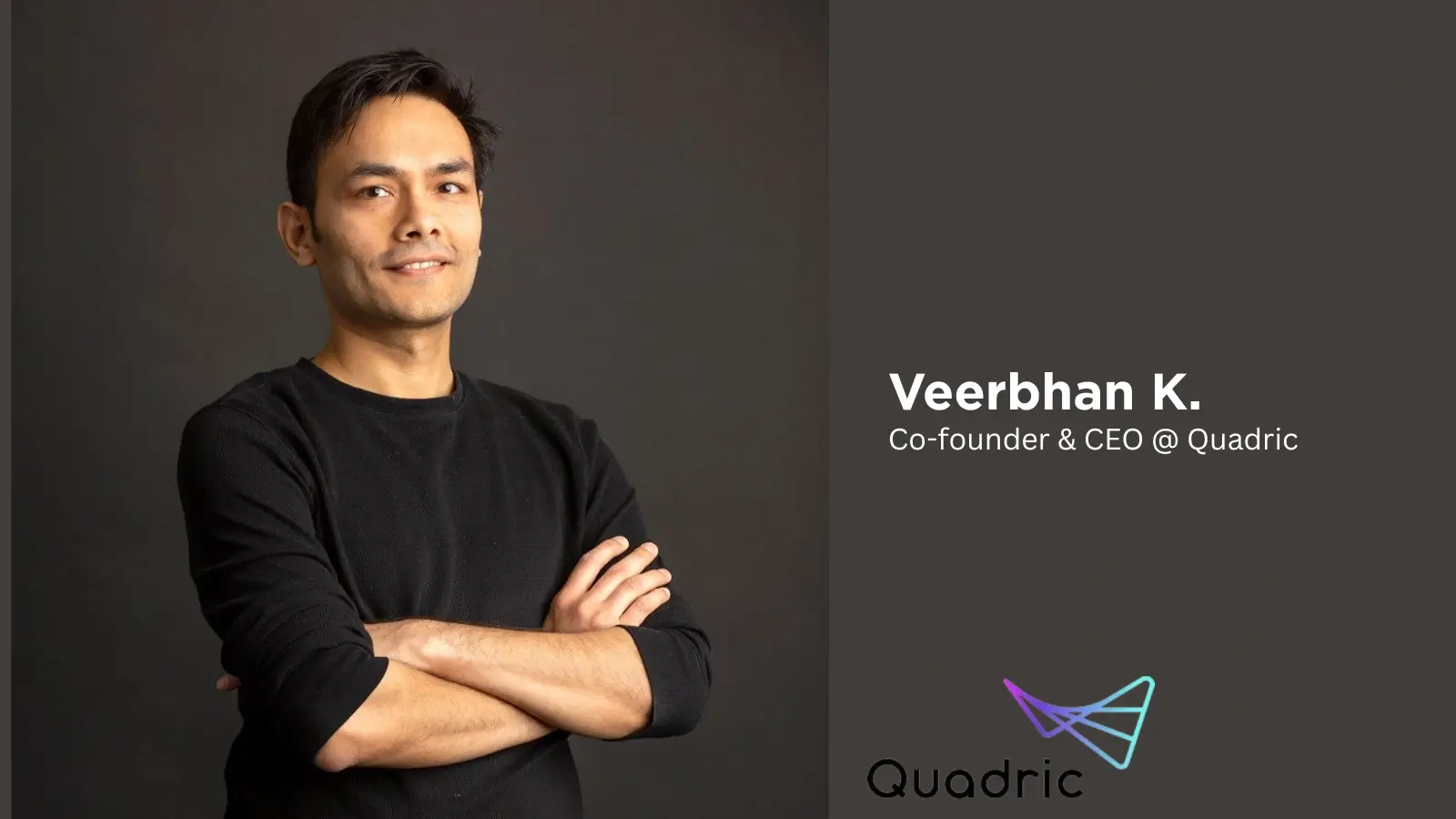Vladimer Botsvadze: Navigating the Future of Digital Transformation and Business Strategy

Meet Vladimer Botsvadze, a passionate expert in digital transformation and marketing innovation. With over 15 years of global experience, Vladimer has become a go-to thought leader and speaker, dedicated to helping organizations embrace technology and thrive in today’s fast-changing world. Ranked as the №1 Global Marketing Thought Leader by Thinkers360, he’s known for empowering everyone from Fortune 500 companies to eager startups. Vladimer's insights not only cut through the noise of the digital landscape but also inspire meaningful connections with audiences.
Business Outstanders has reached out to renowned thought leader Vladimer Botsvadze to gain valuable insights into the future of digital transformation, marketing innovation, and the strategies that can help businesses thrive in an ever-changing landscape. Here is what he had to say:
Interview Highlights:
Q. What are the key trends shaping digital transformation in 2025 and beyond?
In 2025 and beyond, digital transformation will be shaped by several key trends:
-
Generative AI will automate content creation and decision-making, boosting creativity and efficiency.
-
Agentic AI will drive autonomous systems that make decisions and take actions without human intervention, enhancing customer service and operational processes.
-
Quantum Computing will revolutionize industries by solving complex problems at speeds far beyond current capabilities, impacting fields like finance and pharmaceuticals.
-
Automation (RPA) will expand to intelligent automation, improving efficiency and freeing up humans for higher-value tasks.
-
Low-Code/No-Code Development will enable non-technical users to build applications, accelerating innovation and reducing development times.
-
Edge Computing and IoT will enable real-time data processing closer to the source, enhancing performance and reducing latency for applications like smart cities and autonomous vehicles.
-
Hyper-Personalization will leverage AI and data analytics to deliver highly tailored customer experiences, driving loyalty and engagement.
Together, these trends will create a more agile, data-driven, and customer-centric digital landscape.
Q. As one of the world’s top AI speakers, how do you see AI revolutionizing marketing and customer experience in the next decade?
I believe AI will revolutionize marketing and customer experience in the next decade, primarily through Generative AI tools. These tools will enable brands to create highly personalized and dynamic content at scale, allowing them to tell their stories in more meaningful and engaging ways.
Generative AI will empower brands to craft tailored messages, videos, and even interactive experiences that resonate deeply with individual consumers. By analyzing customer data in real-time, AI will help brands anticipate needs and deliver content that is both relevant and timely.
This shift will make marketing more immersive, with hyper-targeted campaigns and personalized journeys that enhance the overall customer experience, foster loyalty, and drive deeper connections between brands and their audiences. Ultimately, AI will make marketing more creative, efficient, and customer-centric.
Q. Many businesses struggle with AI adoption. What are the biggest barriers to AI-driven transformation, and how can organizations overcome them?

Many businesses struggle with AI adoption due to several key barriers. One of the biggest challenges are uncertainty companies often hesitate to adopt new technologies and processes because they are unsure about how they will impact existing systems and workflows. Another significant barrier is the debate over ROI; businesses are hesitant to invest in AI because they can’t always quantify the immediate returns, which can lead to inaction.
However, overcoming these challenges requires a shift in mindset. Brands should become experimental, embracing innovation and taking calculated risks. I love the quote by Jeff Bezos, “If you double the number of experiments you do per year, you are going to double your inventiveness.” This approach encourages companies to focus on learning and adapting, rather than waiting for perfect certainty before acting.
AI adoption doesn't require perfection from day one. Brands should strike while the iron is hot, experiment with AI tools, and learn from the outcomes, even if they don't see instant results.
Q. You’ve been ranked the №1 Global Marketing Thought Leader by Thinkers360. What strategies should brands prioritize to stay ahead in a competitive digital landscape?

To stay ahead in a competitive digital landscape, founders should prioritize building their personal brands. In today’s world, it’s no longer enough to just have a product or service; they need to show their heart, face, and passion. This means connecting with consumers on a deeper emotional level and making them feel like they are part of something bigger.
An essential strategy is establishing a feedback loop — brands should continuously improve their products in real-time based on customer input. Real-time responsiveness is the game. Take Elon Musk as an example. He has perfected the art of interacting directly with Tesla owners on X (formerly Twitter), often responding personally to concerns and suggestions. This real-time communication has allowed him to build a loyal customer base and establish Tesla as a dominant force — without relying on a traditional advertising department.
The human touch is the be-all and end-all. Consumers today want to connect with brands that feel authentic and relatable. Lastly, building a strong community around your brand, where consumers can interact and form strong bonds, is key. This sense of belonging strengthens loyalty and turns customers into passionate advocates. In summary, showing your true self, engaging deeply with consumers, and fostering community are critical strategies for staying competitive in today’s digital landscape.
Q. With over 130,000 followers, you’ve built a strong personal brand. What advice do you have for professionals looking to establish thought leadership on social media?
Building a strong personal brand and establishing thought leadership on social media is all about being pragmatic and authentic. Start small and build gradually — don’t rush the process. The key is to consistently create great content that resonates with your audience. Be curious on a daily basis, always seeking to learn, share insights, and stay on top of trends in your field.
Equally important is showing gratitude to your followers for their engagement. Acknowledge their support and make them feel valued. Patience is crucial — building a thought leadership presence takes time, and results don’t happen overnight. Focus on providing value in every post and interaction. This builds trust and credibility, two cornerstones of any strong personal brand.
It’s also vital to have self-esteem and believe in your voice and message. Stay true to who you are and what you stand for. Think long-term — the goal is to create a lasting impact, not just short-term attention. And last but not least, always focus on giving more than taking. When you offer value to your audience without expecting something in return, you’ll naturally build a loyal, engaged community that looks to you for insights and leadership.
Q. Many brands struggle with customer engagement. What are the most effective ways to build and maintain brand loyalty in the digital age?

Building and maintaining brand loyalty in the digital age comes down to a few core strategies. Transparency is key — customers want to feel like they know the real story behind your brand. Be open and honest about your values, processes, and products, as that builds trust.
Another effective strategy is to position your brand as a media company. Create valuable content that inspires, educates, and entertains your audience, not just promotes your product. Content that truly resonates with people can turn them into loyal followers.
Direct communication also plays a huge role. Engage with your customers on a personal level through social media, emails, or even one-on-one interactions. Responding to their concerns and acknowledging their feedback helps foster a deeper connection.
Building an emotional connection is another powerful tool. Take Harley Davidson, for example. They’ve created a community of over 700,000 riders who come together for a festival in Sturgis, South Dakota, creating a strong emotional bond with their brand. By creating a community where customers feel a sense of belonging, you can encourage long-term loyalty.
Lastly, it’s important to focus on long-term branding. Brands that succeed in the digital age aren’t just looking for quick wins — they’re creating lasting relationships and building a legacy of trust and value. Brands should always prioritize customer relationships over transactional experiences. This is how you build loyalty that lasts.
Q. You mentor entrepreneurs at Techstars, UCLA, and other accelerators. What is the most important piece of advice you give to startup founders?
The most important piece of advice I give to startup founders is to focus on quality over quantity. A great example of this mindset comes from Brian Chesky’s quote: “Build something 100 people love, not something 1 million people kind of like.” It’s better to have a small, passionate, and loyal group of customers who truly believe in your product than a large audience that isn’t fully engaged.
I also encourage entrepreneurs to build a solid social media presence across various platforms. Social media is one of the most powerful tools to connect with consumers in meaningful ways. It’s not just about promoting products; it’s about engaging in authentic conversations, creating valuable content, and truly understanding your audience’s needs. When founders focus on quality, authenticity, and building a genuine community, they’re setting themselves up for long-term success.
Q. You’ve judged prestigious awards like the Gartner Marketing and Communications Awards and the Webby Awards. What do you look for in a truly innovative campaign or product?
What I look for in a truly innovative campaign or product is the ability to build an emotional connection with consumers. Innovation isn’t just about new technology or creative ideas; it’s about how those ideas resonate with people on a deeper level. A great campaign or product taps into the emotions, values, and aspirations of its audience, creating a lasting impact. It’s about telling a compelling story that makes consumers feel seen, heard, and connected to the brand. When that emotional bond is established, the campaign or product becomes not only memorable but also impactful and transformative.
Q. What role does continuous learning play in staying at the forefront of digital transformation, and how do you personally stay ahead of trends?
Continuous learning is absolutely crucial in staying at the forefront of digital transformation. In the fast-paced world of technology, trends and innovations are constantly evolving, and to stay ahead, you must be willing to embrace curiosity every single day. For me, that means dedicating time to read, explore new tools, and engage with thought leaders across various fields. I constantly seek out new perspectives, whether through books, podcasts, or webinars, and ensure I’m always learning from others’ experiences.
By staying curious and open to new ideas, you can anticipate changes and adapt quickly to new opportunities. I also make a point to engage in conversations with other innovators, attend industry events, and participate in communities where new ideas are shared. This habit of continuous learning not only keeps me ahead of trends but also allows me to bring fresh insights and strategies to the work I do with clients and startups.
Q. What’s next for you? Are there any exciting projects, partnerships, or new areas of focus you’re working on in 2025?
I’m continuing my role as a mentor at Techstars, helping startups grow and thrive. As a judge for the Webby Awards, I look forward to recognizing and celebrating groundbreaking digital innovations. I’m also honored to be a guest speaker at top business schools, where I can share my insights with the next generation of leaders.
In addition to that, I’m preparing to deliver lectures, publish bestselling books, and speak at global events to inspire and educate audiences around the world. I’ll be advising more leading brands on their digital transformation journeys and helping them stay ahead of the curve. Ultimately, my focus remains on shaping the next generation of leaders, empowering them with the tools, mindset, and skills to thrive in the ever-evolving digital landscape. There’s a lot to look forward to, and I’m excited to see how these projects progress in the year ahead.
As we wrap up our conversation with Vladimer Botsvadze, it’s clear that his insights into digital transformation and marketing are both timely and inspiring. His emphasis on building genuine connections, fostering innovation, and embracing continuous learning offers valuable lessons for anyone navigating the complexities of modern business. Vladimer's dedication to nurturing the next generation of leaders speaks volumes about his commitment to creating a brighter future. For those eager to adapt and grow in the digital age, his advice serves as a guiding light, reminding us that with the right mindset and tools, anything is possible.



















